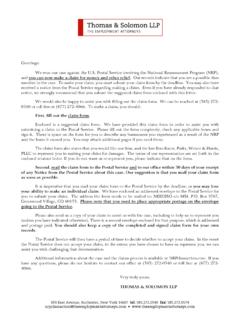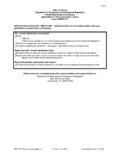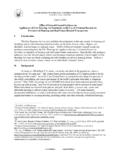Transcription of U.S. EQUAL EMPLOYMENT OPPORTUNITY …
1 EQUAL EMPLOYMENT OPPORTUNITY COMMISSION. Office of Federal Operations Box 77960. Washington, DC 20013. Sandra M. McConnell et al., a/k/a Velva B.,1. Complainant, v. Megan J. Brennan, Postmaster General, United States Postal Service, Agency. Request Nos. 0520180094 & 0520180095. Appeal Nos. 0720160006 & 0720160007. Hearing No. 520-2010-00280X. Agency No. 4B-140-0062-06. DECISION ON REQUEST FOR RECONSIDERATION. On October 30, 2017, the Agency timely requested that the EQUAL . EMPLOYMENT OPPORTUNITY Commission (EEOC or Commission) reconsider its decision in EEOC Appeal Nos. 0720160006. & 0720160007 (September 25, 2017), which found that it violated Section 501 of the Rehabilitation Act of 1973 (Rehabilitation Act), as amended, 29 791 et seq. EEOC. regulations provide that the Commission may, in its discretion, grant a request to reconsider any previous Commission decision issued pursuant to 29 (a), where the requesting party demonstrates that: (1) the appellate decision involved a clearly erroneous interpretation of material fact or law; or (2) the appellate decision will have a substantial impact on the policies, practices, or operations of the agency.
2 See 29 (c). BACKGROUND. This matter concerns a class of Agency employees consisting of rehabilitation and limited-duty injured-on-duty (IOD) employees whose positions were assessed by the Agency's National Reassessment Program (NRP) between May 5, 2006 and July 1, 2011. The class claims were I This case has been randomly assigned a pseudonym which will replace the Class Agent's name when the decision is published to non-parties and the Commission's website. 2 0520180094. categorized into four broad categories, three of which are relevant here: withdrawal of reasonable accommodations; hostile work environment; and disclosure of confidential medical information. In our decision in EEOC Appeal Nos. 0720160006 & 0720160007, in relevant part, we reversed the Agency's final order rejecting the findings of discrimination made by summary judgment by an EEOC Administrative Judge (AJ) in favor of the class in her June 4, 2015 preliminary decision,2. which she later finalized. Our previous decision affirmed the AJ's findings that the Class Agent established that the NRP subjected qualified rehabilitation and limited-duty IOD employees to disparate treatment and resulted in rehabilitation and limited-duty IOD employees with disabilities having their reasonable accommodations withdrawn, as well as being subjected to disability-based harassment and having their confidential medical information accessed by unauthorized persons.
3 Based on a de novo review of the record, we also found that Phase 1 of the NRP (the process used to identify all IOD employees who were either in limited-duty or rehabilitation status) constituted an unlawful medical inquiry to which the class of rehabilitation and limited-duty IOD employees were subjected. The AJ also issued a separate preliminary decision on June 4, 2015, making findings of discrimination in favor of the Class Agent as an individual. The AJ accurately recounted that in EEOC Appeal No. 0720080054 (January 14, 2000), we had previously found that the Class Agent was a qualified individual with a disability. The AJ determined, in relevant part, that the Class Agent was discriminated against based on her disability when she was disparately treated and her reasonable accommodation was withdrawn. The Agency also rejected this finding. In EEOC. Appeal Nos. 0720160006 & 0720160007, we found that the Class Agent, having established that she is a qualified individual with a disability, was eligible for immediate relief regarding disparate treatment and withdrawal of reasonable accommodation.
4 We found that the Class Agent was eligible for immediate relief for a hostile environment, having established she is a qualified individual with a disability who was subjected to a tangible EMPLOYMENT action. We further found that having established that she was subjected to an unlawful disability-related medical inquiry and the confidentiality of her medical records were comprised via Phase 1 of the NRP, the Class Agent was eligible for immediate relief. The Agency now requests that we reconsider our decision in EEOC Appeal Nos. 0720160006 &. 0720160007. ANALYSIS AND FINDINGS. In its request for reconsideration, the Agency essentially presents many of the same arguments already raised and considered in our previous decision. We emphasize that a request for reconsideration is not a second appeal to the Commission. See EQUAL EMPLOYMENT OPPORTUNITY Management Directive for 29 Part 1614 (EEO MD-110), Chap. 9, (as revised August 5, 2015). Rather, a reconsideration request is an OPPORTUNITY to demonstrate that the appellate decision involved a clearly erroneous interpretation of material fact or law, or will have 2 The AJ finalized both her preliminary decisions on September 21, 2015.
5 3 0520180094. a substantial impact on the policies, practices, or operations of the Agency. The Agency has not done so here. In its request for reconsideration, the Agency argues, like it did before, that the AJ applied the incorrect standard of review of "more likely than not" in finding liability, and now argues that the previous decision repeated this error. As found in our previous decision, the Agency confuses the concepts of "standard of review" and "burden of proof." Contrary to the Agency's argument, the Commission has routinely ruled that after an AJ determines there is no genuine issue of material fact in dispute, on summary judgment the complainant carries the burden of proof by the preponderance of the evidence (more likely than not) that discrimination occurred. See , McCready v. Dep't of Veterans Affairs, EEOC Appeal No. 0120062351 (April 1, 2003); Mallis v. United States Postal Service, EEOC Appeal No. 01A55908 (October 3, 2006); Complainant v. EQUAL EMPLOYMENT OPPORTUNITY Commission, EEOC Appeal No.
6 0120092463 (August 28, 2014). The Agency also again argues that there are genuine issues of material fact in dispute. For example, the Agency recounts a passage in the previous decision that the Class Agent's evidence contradicted the explanation of the NRP's purpose and critically undermined Agency witnesses'. credibility thereon. The Agency argues that it is improper to make credibility determinations in deciding whether there are genuine issues of material fact. While we agree with the Agency's statement of the law, we disagree that the previous decision in any way relied on credibility determinations in affirming the AJ's decision on summary judgment. The previous decision found that the "..massive evidentiary " ".. " the real reason for the NRP's existence, which was to move as many IOD employees as possible back to full duty in their pre- injury jobs or onto the Office of Workers' Compensation Program (OWCP) rolls for eventual outplacement. We found, in essence, that the evidence of the real reason was so overwhelming that there was no genuine issue of material fact thereon, despite some witness testimony to the contrary.
7 For the reasons found in the previous decision, we find that there were no genuine issues of material fact in dispute. The Agency argues, like it did on appeal, that the AJ incorrectly found that no portion of the class and the Class Agent's individual claims were "mixed" (included matters appealable to the Merit Systems Protection Board (MSPB)), and now argues that the previous decision repeated this error. We disagree. As found in the previous decision, the MSPB has ruled multiple times that the NRP. class action complaint is not mixed. We add that the MSPB also found that the Class Agent's individual claim is not mixed, explicitly concluding it did not have jurisdiction over her appeal and thus could not consider her disability discriniination claim. MSPB Decision NY-0353-06- 0381-1-1, 2007 WL 2239099 (June 1, 2007). Arguing that the medical inquires it made in Phase 1 of the NRP were lawful, the Agency avers that the previous decision erred in finding that these inquiries violated the Rehabilitation Act.
8 However, the previous decision determined that unlawfully based their medical inquiries solely on the status of the IOD employees, without any evidence that those employees were not performing the essential functions of their positions or that they posed a direct threat to themselves or others by remaining in their positions. The Agency argues that in evaluating whether class members 4 0520180094. could perform the essential functions of their positions, the previous decision erred in considering their modified assignments as their positions instead of their positions of record. We disagree. In a prior decision affirming the AJ's certification of this class, we found that where an employee has performed a modified position for an extended amount of time, it is that position which is considered for purposes of determining whether the employee is a qualified individual with a disability. EEOC Appeal No. 0720080054 (Jan. 14, 2010). EEOC Appeal No. 0720080054 is final, has become the law of the case, and is consistent with other decisions regarding modified positions unrelated to the class action.
9 See , Huddleson v. United States Postal Service, EEOC Appeal No. 0720090005 (Apr. 4, 2011). Huddleson contained case cites of other Commission cases holding the same. We find, for the same reasons in our previous decision, that the referenced medical inquiries violated the Rehabilitation Act. The Agency further argues that the previous decision erred in assuming that all modified assignments provided to class members were reasonable accommodations (in other words, did not consist only of "make work"). In the context of making this contention, the Agency argued again that we should look at class members' positions of record, not the referenced modified positions in determining the Agency's reasonable accommodation obligations. As already noted, we have specifically rejected this argument. In reaching the finding of liability, we properly determined that the modified assignment of the Class Agent, as well as the class members, was properly characterized as a reasonable accommodation.
10 As such, we determined that these employees were entitled to remain in their limited-duty or rehabilitation positions unless the Agency could demonstrate that allowing them to do so would impose an undue hardship on its operations. We then went on to conclude that the Agency failed to establish undue hardship. We found that the driving force behind the NRP was not to ensure that rehabilitation and limited-duty IOD employees were performing only work that was necessary to the Agency's mail delivery operations, as contended by the Agency, but to move as many of them as possible back to full duty in their pre- injury jobs or onto the OWCP rolls for eventual outplacement, and this was motivated by discriminatory animus (disparate treatment). The Agency argues that the previous decision erred in considering the Class Agent's individual claim of hostile work environment because she did not appeal the AJ's finding that she was not entitled to damages on this matter. The Agency refers to the AJ's findings that the Class Agent as an individual offered no evidence that she was ever told that she would end up at Walmart or feared having to work there due to the NRP, and accordingly is denied damages related to this specific claim.








